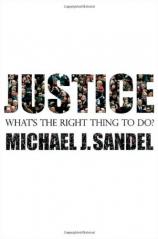Justice: What’s the Right Thing to Do?
Review
Justice: What’s the Right Thing to Do?
For more than two decades, Harvard professor Michael Sandel has taught one of the most popular courses at the University. The class, Justice, has been attended by 15,000 students and currently enrolls upwards of 1,000 each year. Recently, portions of the class were presented by public television station WGBH and Harvard University in a 12-episode series, which is also available on Sandel’s website, www.justiceharvard.org.
JUSTICE, now available in paperback, was written by Sandel as an accompanying volume to the class. It is not a textbook, but rather a limited discussion and presentation of many of the provocative hypotheticals that form the stepping-off point for class discussion. Should innocent civilians be killed to save a military mission? Should entertainers make millions while school teachers struggle to earn a decent salary? Should surrogates be allowed to sell the babies who grow in their wombs? Questions abound, and the purported answers only raise more questions. While such questions are as old as the great philosophers of ancient times, Sandel has the remarkable ability to weave 21st-century thinking into the discussion. From Shakespeare to the Simpsons, from Woody Allen to the Clinton impeachment trial, it is Sandel’s ability to modernize the philosophical debates of the centuries that explain the astonishing popularity of Justice as an educational vehicle.
“Great cases like hard cases make bad law,” observed Oliver Wendell Holmes. “For great cases are called great, not by reason of their importance...but because of some accident of immediate overwhelming interest which appeals to the feelings and distorts the judgment.” But JUSTICE is far more than a book about law. Sandel presents us with a problem, asks readers to identify the principles that apply to solving that problem, and then reminds us that it may be very difficult to always have those principles line up as a correct solution to the problem. During the American Civil War, wealthy citizens paid poor young men several hundred dollars to take their place after having been drafted. Today, most citizens would view that action with scorn. At the same time, however, the modern volunteer army that allows many citizens to avoid military service is considered to be a wonderful institution. As a nation, if we were honest with ourselves, military service would be viewed as an important civic obligation. Ironically, such a stance might have serious ramifications for our present foreign military efforts.
JUSTICE is a moral and intellectual page-turning debate that reflects upon those issues talked about on a daily basis across the land. Sandel shows readers that debates on issues ranging from abortion to affirmative action and gay marriage can be conducted in an adult and non-polemic manner that does not reduce every argument to an ad hominem political attack. Indeed, the great value of Sandel’s course, as well as accompanying texts, lies in what it teaches us about morality and justice. More than anything else, we learn that a full, frank and open debate can be conducted without rancor or name-calling. Were such debates the rule rather than the exception, our political discourse might be far more productive.
Beyond the mere contents of the book or the Socratic dialogue of the lectures, whatever road one takes to follow the moral discussions of Sandel, there is a timely message for all of us to end the bitter bickering that serves no purpose in the discussions of important issues. Perhaps that is an unintended message of JUSTICE. But whether intended or unintended, raising the level of political discourse beyond that presently followed in our sound-bite society cannot be a bad thing. Sandel, through his book and his teaching, has made a major contribution to raising the level of political debate for all of us.
Reviewed by Stuart Shiffman on January 22, 2011
Justice: What’s the Right Thing to Do?
- Publication Date: August 17, 2010
- Genres: Nonfiction
- Paperback: 320 pages
- Publisher: Farrar, Straus and Giroux
- ISBN-10: 0374532508
- ISBN-13: 9780374532505



